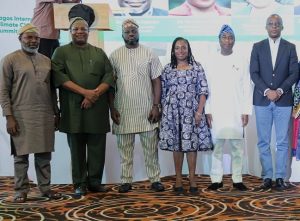Gov. Babajide Sanwo-Olu of Lagos State has called for continuous increase and sustained financing to address climate change challenges in the state.

Sanwo-Olu said this at the closing ceremony of the 10th Lagos International Climate Change Summit, on Thursday, June 13, 2024, in Lagos.
The governor emphasised the need for collaboration among governments, financial institutions, and international organisations to bridge the financing gap.
Represented at the summit by his deputy, Dr Obafemi Hamzat, Sanwo-Olu highlighted the urgency for governments to direct resources toward projects that provided tangible benefits for communities and ecosystems.
“We are committed to fostering a supportive environment for climate finance and local adaptation initiatives, ensuring that all efforts align with the insights and expertise shared,” Sanwo-Olu said.
He commended the participants for their resolve to work with all stakeholders to transform discussions into concrete actions that benefited both communities and the environment.
He stressed that accelerating climate finance involved not only mobilising funds but also ensuring that these resources reached those most in need.
He noted that to achieve the set objective required creating financial instruments that are accessible, equitable, and effective.
Sanwo-Olu emphasised the government’s commitment to prioritising capacity building and knowledge sharing, adding that this would involve empowering local communities with skills, tools, and knowledge needed to develop and implement adaptation strategies.
He also stressed the importance of strengthening policy frameworks and regulatory environments to support climate action, while maintaining a commitment to inclusivity and equity.
According to him, climate action must be inclusive, ensuring that marginalised and vulnerable groups are not left behind.
Sanwo-Olu highlighted the importance of giving women, youths, indigenous peoples, and other underrepresented communities a voice in decision-making processes that affected their lives and livelihoods.
Experts at the summit highlighted innovative financing mechanisms, such as green bonds and climate insurance, and the importance of leveraging both public and private sector investments.
The discussions underscored the necessity of a systemic shift in how financial resources are perceived and deployed for climate action.
By Fabian Ekeruche
